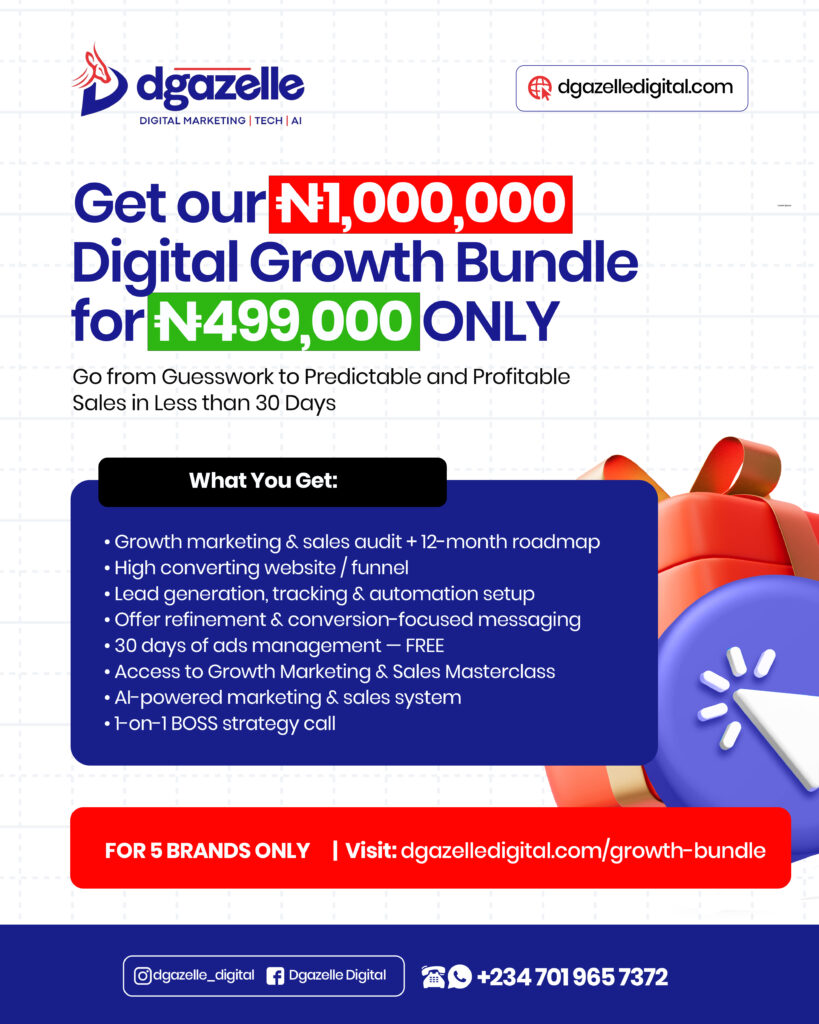Growing a business in Nigeria is exciting… but it’s not easy
You start with fire in your belly and a product or service you believe in. Your friends and family buy from you. Strangers start showing interest. Cash starts coming in.
Then, one day, you realise something: your business can’t keep running the same way it did when you started. Orders are getting delayed. You can’t keep track of customers. You’re working longer hours, but profit isn’t growing at the same speed.
That’s the scaling wall. Every business hits it.
Scaling is different from starting. Starting is about proving your idea works. Scaling is about building the systems, people, and mindset to handle 10 times more customers without collapsing.
Here are 7 non-negotiables you must have in place before you try to scale. Ignore them and you’ll end up frustrated, overworked, and possibly out of business.
1. A Clear and Tested Business Model
Scaling a broken business model is like pouring more water into a leaking bucket.
- Before you think about growing bigger, ask:
- Do you know your exact profit per sale?
- Can you predict your monthly income with reasonable accuracy?
- Are your customers buying again and again, or is it a one-time thing?
In Nigeria, many small businesses skip this step. They see sales growing and assume they’re ready to expand. But if your numbers don’t add up at a small scale, those losses will multiply when you go big.
Action Step: Calculate your gross margin, net profit, and customer lifetime value. If you can’t answer “How much does it cost me to get one customer, and how much do they spend in total?” you’re not ready to scale.
2. Strong Cash Flow Management
Scaling eats cash. New staff. Bigger inventory. Better tools. Marketing campaigns.
And here’s the Nigerian reality: banks aren’t always quick to give SMEs the loans they need. That means your scaling plan must be backed by solid cash flow management.
Your goal isn’t just to make sales. It’s to make sure you have enough cash at the right time to pay for growth.
Pro Tip : Businesses that forecast cash flow monthly are 30% more likely to survive scaling than those that don’t.
Action Step: Keep a rolling 3-month cash flow forecast. If you expect a shortfall, plan how you’ll cover it before it becomes a crisis.
3. Standard Operating Procedures (SOPs)
When you’re small, you can keep everything in your head. You handle orders yourself. You talk to every customer. You decide how every problem is solved.
When you scale, that’s impossible. You’ll need other people to run daily operations, and they can’t read your mind.
That’s where SOPs come in. SOPs are step-by-step guides for how things are done in your business, from handling complaints to processing payments.
Put it this way: “If your business can’t run without you for 30 days, you don’t own a business. You own a job.”
Action Step: Start documenting how you do things now. Use video screen recordings, written checklists, or even voice notes. Train your team with these SOPs so your quality stays the same as you grow.
4. A Reliable Team
You can’t scale with part-time commitment from part-time people.
Scaling requires people who not only do their jobs but also think ahead, solve problems, and represent your brand well. In Nigeria’s competitive market, the right team is a huge advantage.
But here’s the trap: many small business owners hire only when they’re desperate. That leads to bad hires, high turnover, and frustration.
Action Step: Hire slowly, train well, and treat your team like partners. Give them clear roles, measurable targets, and incentives to perform.
Remember, in scaling, people are your leverage.
5. Scalable Marketing Systems
Scaling isn’t just “doing more marketing”. It’s having marketing systems that predictably bring in customers at a profit.
You can’t rely only on word of mouth when you want to 5x or 10x your revenue. You need a mix of channels, Facebook and Instagram ads, SEO, email marketing, and influencer collaborations that work together to bring in leads and convert them into paying customers.
Track the numbers religiously: cost per lead, conversion rate, customer acquisition cost…
Action Step: Build a marketing funnel. For example:
- Run Facebook ads to a lead magnet or discount.
- Collect emails or WhatsApp contacts.
- Nurture leads with valuable content and offers.
- Close sales through calls or direct messaging.
6. Technology and Tools
In Nigeria, many businesses still run on paper, WhatsApp chats, and memory. That’s fine when you’re small, but it will kill you at scale.
Technology allows you to handle more customers with less stress. From inventory software to CRM (Customer Relationship Management) tools, from accounting apps to automated email systems, these tools free up your time and reduce mistakes.
Action Step: Identify bottlenecks in your business and find a tool to fix them. If you spend hours every week chasing payments, get an invoicing and payment app. If you forget to follow up with leads, use a CRM that sends reminders.
7. A Leadership Mindset
Scaling isn’t just about resources. It’s about you, the owner.
When you’re a startup founder, you’re in the trenches doing everything yourself. When you’re scaling, you must shift from operator to leader. That means:
- Trusting your team to handle daily tasks.
- Focusing on strategy, partnerships, and growth.
- Learning to say “no” to distractions.
In Nigeria’s fast-changing market, leaders who adapt quickly and think long-term are the ones who survive and dominate.
Put it like this: if you’re the smartest person in the room, you’re in the wrong room. Surround yourself with mentors, experts, and peers who challenge you.
The Bottom Line
Scaling a business isn’t just “working harder”. It’s working smarter and building a machine that can run and grow without breaking.
Before you chase bigger numbers, make sure you have:
1. A tested business model
2. Strong cash flow
3. Documented SOPs
4. A reliable team
5. Scalable marketing systems
6. The right technology
7. A leadership mindset
Get these in place, and scaling becomes less of a gamble and more of a plan.
If you’re a Nigerian business owner ready to scale but not sure how to put these systems in place, don’t guess; get expert help.
At Dgazelle Agency, we help businesses like yours design marketing funnels, automate processes, and scale profitably.
📩 Click here to contact us today, and let’s build your scaling strategy.







